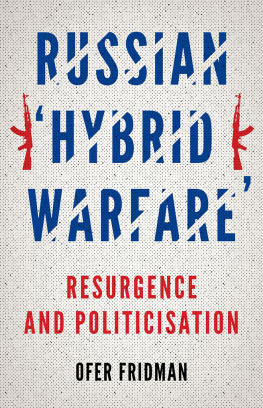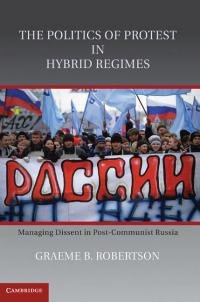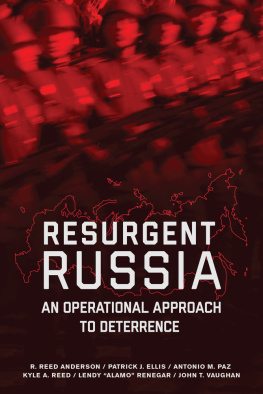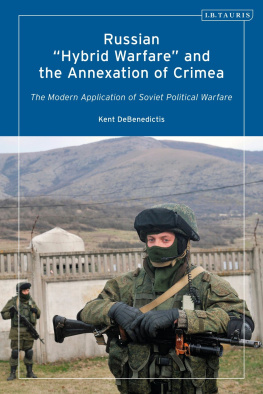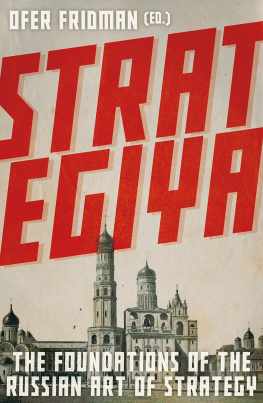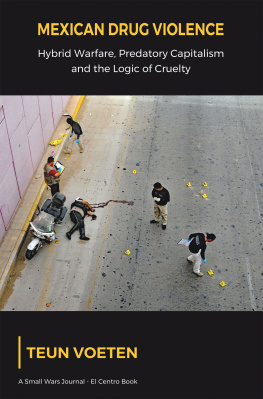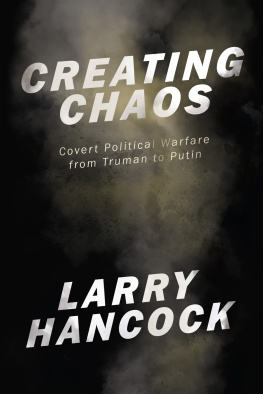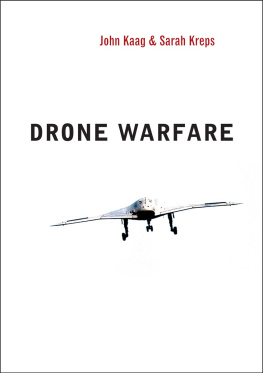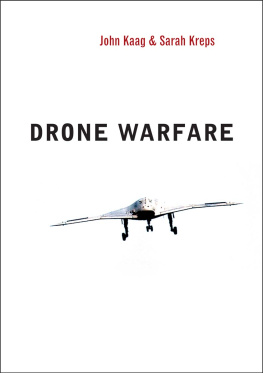RUSSIAN HYBRID WARFARE
OFER FRIDMAN
Russian Hybrid Warfare
Resurgence and Politicisation


Oxford University Press is a department of the University of Oxford. It furthers the Universitys objective of excellence in research, scholarship, and education by publishing worldwide. Oxford is a registered trade mark of Oxford University Press in the UK and certain other countries.
Published in the United States of America by Oxford University Press 198 Madison Avenue, New York, NY 10016, United States of America.
Ofer Fridman, 2018
All rights reserved. No part of this publication may be reproduced, stored in a retrieval system, or transmitted, in any form or by any means, without the prior permission in writing of Oxford University Press, or as expressly permitted by law, by license, or under terms agreed with the appropriate reproduction rights organization. Inquiries concerning reproduction outside the scope of the above should be sent to the Rights Department, Oxford University Press, at the address above.
You must not circulate this work in any other form and you must impose this same condition on any acquirer.
Library of Congress Cataloging-in-Publication Data
Names: Ofer Fridman
Title: Russian Hybrid Warfare: Resurgence and Politicisation / Ofer Fridman.
Description: Oxford [UK]; New York: Oxford University Press, [2018]
ISBN: 9780190877378 (print)
ISBN: 9780190934736 (updf)
ISBN: 9780190934958 (epub)
But if the thought corrupts language, language can also corrupt thought. A bad usage can spread by tradition and imitation even among people who should and do know better.
George Orwell, 1946
CONTENTS
PART 1
THE RISE OF HYBRID WARFARE
PART 2
THE RISE OF GIBRIDNAYA VOYNA: THE RUSSIAN THEORY OF HYBRID WARFARE
PART 3
THE POLITICISATION OF HYBRID WAR AND GIBRIDNAYA VOYNA
I am indebted to many scholars whose works are dutifully noted throughout the book; they might not subscribe to the argument I present and definitely bear no responsibility for any errors and mistakes in the text. The responsibility for all views and mistakes is mine and mine alone.
This project would not have been possible without the generous and priceless assistance of many people, to whom I would like to express my gratitude. On the academic front, special thanks are due to Beatrice Heuser, to whom I owe a great deal. I was fortunate to benefit from her approachability and encyclopaedic knowledge; her remarks and continuous support were absolutely invaluable. For his comments and advice during the initial stages of my research, I am especially grateful to Frank G. Hoffman, whose help and support encouraged me to carry on with my research. Thanks are also due to Derek M.C. Yuen for his useful comments on my interpretation of unrestricted warfare.
In the process of completing this project, I was fortunate to spend a highly productive time at the Kings Centre for Strategic Communications (KCSC) at Kings College London. For making my time especially fruitful, I owe my appreciation to Neville Bolt, whose readiness to help went far beyond my expectations; to David Betz, whose wise advice I benefited from enormously; and to the remaining members of the centres team, whose valuable comments were always useful. I also want to acknowledge Sagit Carmeli for her devoted and excellent editing, which turned my scrambled thoughts into a readable textthis project would not have been possible without you.
I would also like to express my gratitude to friends and relatives, of whom there are too many to list, who had probably never quite understood why, or indeed what, I was doing, but always believed in me and in my project nevertheless. I thank you all for believing in me even when I did not.
Last, but definitely not least, I would like to thank the Gerda Henkel Foundation for supporting this project, and Thomas Podranski, manager of the special programme entitled Security, Society and the State, who helped me through many intricate administrative issues.
I became interested in so-called hybrid warfare in late 2015, when two different books navigated their way on to my table. The first was entitled NATOs Response to Hybrid Threats, edited by two researchers from the NATO Defence College in Rome, Guillaume Lasconjarias and Jeffrey Larsen; Since the first of the two books was written in the West and the second in Russia, I expected to find different views and interpretations of more or less similar ideas, particularly so as both books claimed to deal with the same phenomenonhybrid war. However, when reading these books, I was surprised to discover that the only mutual ground between them was their titles.
Intrigued, I went on a questa research journey into the blue waters of academic, military and political scholarship on the nature of hybridity in contemporary conflicts in Russia and the West. This journey led me to study many different conceptualisations and perspectives, some of which were more interesting than others; some were intellectually challenging, while others tried to reinvent the wheel; some were academically solid and well researched, whereas others were filled with contradictions.
As I continued my research, it quickly became clear that the concept of hybrid warfare had been politicised, both in the West and in Russia. A concept that had initially been intended to offer a better understanding of the nature of contemporary conflicts has been weaponised, becoming a tool in internal manoeuvring for finance, public opinion and political power in Russia and the West, as well as a means of intimidation in relations between the two.
In their analysis of Russias reaction to the Ukrainian Crisis in 2014, Western experts have argued that the Kremlin has embraced hybrid warfare as its strategy in Ukraine. Many Russian strategists and political observers, in contrast, have contended that the West is in fact conducting a hybrid war (gibridnaya voyna) against Russia. This book aims to explain the reasons behind these mutual criminations. What does hybrid warfare mean in the West, and what is gibridnaya voyna in Russian eyes? Are they similar, and if not, how do they differ? Why have the terms hybrid warfare and gibridnaya voyna become so politicised in Russia and the West since the Ukrainian Crisis? Did the Kremlin, or the West, behave in a way that requires a new conceptualisation of warfare, or is the term itself just a new label for an old concept?
Answering these questions was the principal focus of my research. Yet the book does not focus on the Ukrainian Crisis per se. Instead, it examines the fundamental differences between hybrid warfare, gibridnaya voyna and all other associated concepts that preceded, accompanied and outlived these two in the Western and Russian scholarship. This book tries to grasp how political forces have shaped conceptual thinking, which has made it easier for one side to accuse the other of illegal actions while, simultaneously, enabling one side to fend off their adversarys criticism of any wrongdoings.
What this book is about (and what it is not about)
This book is not about hybrid war as an actual practice. The book discusses neither the tactics of what Western analysts commonly call Russian hybrid, cyber or information wars (with their hacks, leaks, internet trolls or disinformation and propaganda operations conducted by pro-Russian or Russian-financed media), nor the actions of what Russian experts describe as the Western

